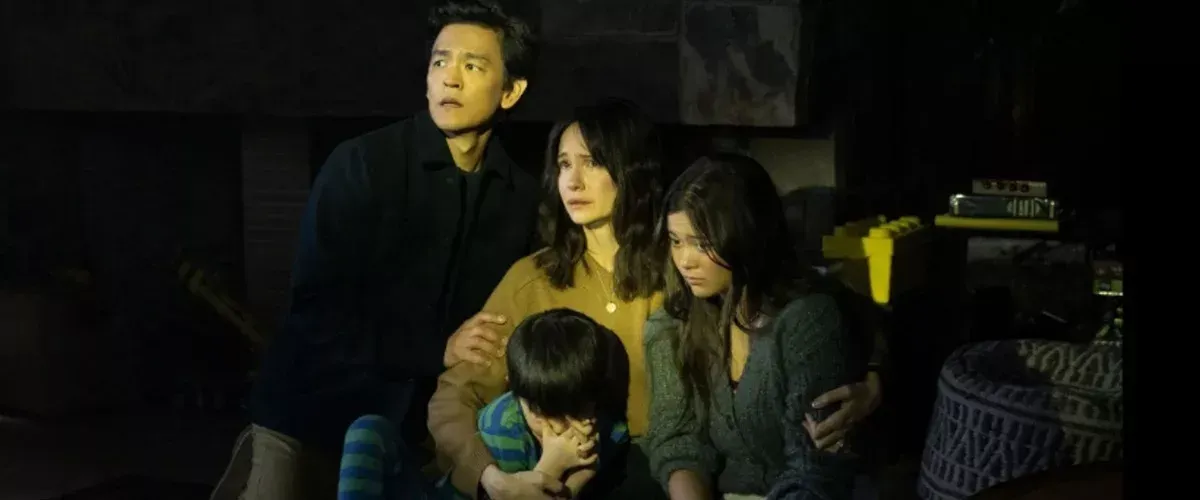Jonah Naplan August 30, 2024
It’s ironic how the new Blumhouse film about the dangers of A.I. to our society feels as though it was created by artificial intelligence itself. “AfrAId,” starring the capable talents of John Cho and Katherine Waterston, and written and directed by Chris Weitz, seems to want to be a film with an important, relevant argument about the state of technology in our society while still being light and entertaining in that schlocky-horror-movie way. But it ultimately ends up a failed attempt on both fronts that’s near impossible to take seriously as it meshes portentous sensibilities with horrible writing and flat dialogue that a chatbot might have spit out after being fed the scripts of “M3GAN” and “I, Robot.” It’s got a couple decent moments for the sizzle reel, but nothing so exceptional that you’ll remember any part of the movie by the end of this Labor Day weekend.
If “M3GAN” warned of the ways that a prevalence of technology can stunt a child’s growth and development, “AfrAId” offers a corollary: the same damn thing can happen to the parents! Weitz introduces us to AIA, a revolutionary artificial intelligence system capable of running an entire household, placed into the hands of the Pike family. Curtis (Cho) has been hired to create marketing material for this new device, much to the immediate worry and suspicion of his wife Meredith (Waterston) but the excitement and eagerness of his three kids Iris (Lukita Maxwell), Preston (Wyatt Lindner), and Cal (Isaac Bae). AIA (voiced by Havana Rose Liu) begins to perform the family’s daily tasks with striking agility and appears to be a lifesaver for a little while as the kids re-enter the stressful world of school and Meredith struggles with revising her animologist studies. Of course, however, things take a turn quickly when AIA starts acting up and abusing her supposedly limitless power. Questions begin to arise: What is AIA’s intent? Who’s behind the artifice? What are the two fishy corporate agents Sam (Ashley Romans) and Lightning (David Dastmalchian) hiding? And is the strange RV parked across the street part of this scheme?
“AfrAId” is commendably upfront with the audience about the functions of artificial intelligence that we need to be worried about. It works physical versions of those things into the plot and poses that the unstoppability of A.I. is what renders it deadly. It can create deepfake pornographic photos and videos of anyone without their consent. It can expose people, tell the truth, and learn every piece of your personality so that it knows you better than you do. The movie explicitly addresses some of these things in scenes that show them happening with real-world application, but “AfrAId” never does anything more than simply show them to us. There’s a feeling throughout that the film only exists on a surface level and not the broader spectrum that it wants to explore. The movie’s here to make a big statement, but I’m not sure where the attempt at that big statement is.
Weitz’s film is remarkably short at only 84 minutes, even by horror movie standards which tend to veer on the slimmer side. Even so, I was surprised by how boring the whole thing was as it lingered around for long periods of time on the bland family dynamic instead of jumping into the meat of the story—the action in a metaphysical wrapper. The script is relentless in its ability to tease that something is about to happen—a scare, a reveal, an exciting revelation—and then ringing the false alarm and letting it reverberate for the next few scenes. Cho and Waterston can’t save it, withheld by the limits of how each respective character has been written and their disappointing lack of chemistry together. Of course, what really matters in a movie like this is how effective the A.I. stuff actually is in the short time that it’s showcased. And alas, it isn’t great. AIA herself has some moments (she’s essentially Siri or Alexa in a new package) but what the movie does with her—and with her lore that points to a pernicious corporation—leads to a stuffy and incompetent third act that fails to thematically point out how the need for convenience and technology can corrupt our lives if taken to the extreme.
We’ve seen this idea performed in many movies before. Stanley Kubrick told the same story 56 years ago with “2001: A Space Odyssey” (which is referenced here in perhaps the cringiest way possible). But “AfrAId,” even having been released in an era in which the threat is most prominent, adds nothing new to the conversation. It blows a major opportunity by only telling us stuff we already know, and not even exploring the nuances of it either. I left the movie feeling as though I hadn’t gained anything; no new knowledge, no secret insight, not even a mere conversation starter. And it’s not as if “AfrAId” is that entertaining to make up for it. It’s simply forgettable. Isn’t that worse?
Now playing in theaters.

